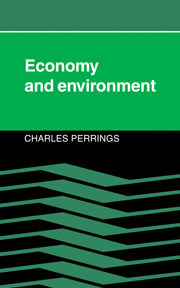 Economy and Environment
Economy and Environment Book contents
- Frontmatter
- Contents
- Preface
- Notation Guide
- 1 Introduction
- Part I The physical economy-environment system
- Part II The economic system
- 5 The price system
- 6 Prices, property, and the environment
- 7 Economic conflict and environmental change
- Part III Environmental strategies in an evolutionary economy-environment system
- References
- Index
6 - Prices, property, and the environment
Published online by Cambridge University Press: 20 March 2010
- Frontmatter
- Contents
- Preface
- Notation Guide
- 1 Introduction
- Part I The physical economy-environment system
- Part II The economic system
- 5 The price system
- 6 Prices, property, and the environment
- 7 Economic conflict and environmental change
- Part III Environmental strategies in an evolutionary economy-environment system
- References
- Index
Summary
Property, possession, and control
The value system in any economy defines the weights in exchange of a given set of proprietary resources (assets) or, more properly, of the services deriving from those resources. The value system thus supposes a corresponding set of property rights. Once we come to look at the role of prices in an economy-environment system, we need to add that the set of property rights is characterized by a clear distinction between recognized (positively valued) and unrecognized (zero valued) rights. If a resource used in a human economy is zero valued, then it is exacted and is not subject to recognized property rights. If the same resource is positively valued, then it is transacted and subject to recognized property rights. So the distinction, for example, between slaves and free persons in human societies is that the former are not recognized as having rights of property over their various capacities, while the latter are. The labor of the slave is exacted; the labor of the free person is transacted.
The distinction between zero and positively valued resources rests first and foremost on a technical consideration. From equation 5.6 it follows that zero-valued resources are defined by the fact that they directly require no positively valued resource for their production. In other words, up to the point at which the exaction of a zero-valued resource occurs its production is directly independent of all positively valued resources.
- Type
- Chapter
- Information
- Economy and EnvironmentA Theoretical Essay on the Interdependence of Economic and Environmental Systems, pp. 79 - 94Publisher: Cambridge University PressPrint publication year: 1987


